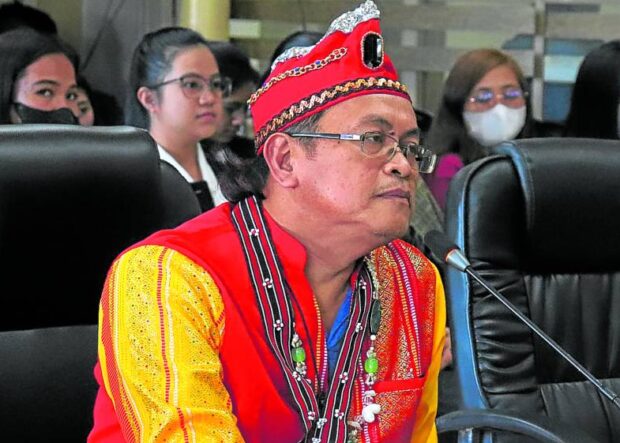
JOVITO SALONGA—PHOTO COURTESY OF BAGUIO CITY
BAGUIO CITY—The National Bureau of Investigation has been asked to check a foundation for allegedly issuing what it describes as certificates indicating the “judicial acquisition of title” to help legitimize informal settlements in Baguio.The city council on Monday voted to send to the NBI and other land titling agencies all the information it gathered from its inquiry into the local activities of the Bagong Lahing Pilipino Development Foundation, and Bagong Lahing Pilipino Cooperative, as represented by one of its leaders, Jovito Salonga.
Salonga introduced himself as a “doctor of customary law” who serves as the cooperative’s vice president, a representative of a “Maharlika Federacy” and a tribal government, and who claims to be the chair of a “Maharlika Ecclesiastical Council.”
But Salonga said he was not related to his namesake, the late senator and human rights icon Jovito Salonga. His organization, he said, helps landless members of his cooperative by invoking the supposed land rights granted to “Don Domingo de Ocampo” through a 1913 Decree (numbered 10139 covering 117,000 hectares based on court filings in the Supreme Court archives).
According to Salonga, his group was operating using the “Torrens titling system” which supposedly grants them special privileges after the group acquired De Ocampo’s land rights. He was referring to the country’s system of recording private properties which was instituted in 1903 by the American colonial government.
IP rights
Salonga also said their actions are supported by the country’s only law protecting indigenous peoples’ (IP) rights (Republic Act No. 8371, or the Indigenous Peoples Rights Act of 1997, or Ipra).
The group, he said, does not sell land titles. Instead, members of the cooperative discuss how to help by “extending” De Ocampo’s judicial rights so they could acquire land titles in Baguio.
When asked, he said the group had helped about 10 cooperative members.
But two of the beneficiaries were granted judicial titles over lands that are within military reservations.
One of the beneficiaries is a cousin-in-law of Councilor Fred Bagbagen, a lawyer, who said he was considering legal action against Bagong Lahing Pilipino.
Other lawyers in the council like Peter Fianza and Betty Lourdes Tabanda stressed that Baguio is a townsite reservation where “judicial land titles” have not been applied since 1908.
Under the townsite, prospective land owners file townsite sales applications for alienable lands, apply for miscellaneous land sales or secure free patents from the Department of Environment and Natural Resources.
Ibaloy residents in Baguio have sought recognition of their ancestral lands through Certificates of Ancestral Land Title or Certificates of Ancestral Domain Title but recent Supreme Court rulings have cited Baguio’s exclusion from Ipra coverage.
‘Floating’ descriptions
Councilor Isabelo Cosalan Jr., a geodetic engineer, pointed out that one of the sample documents supplied by Salonga outlined what he described as “floating” technical descriptions that could not be located on a map.
Another councilor and lawyer, Jose Molintas, also said documents provided by Salonga refer to Supreme Court decisions in 1996 that have dismissed all land claims that rely on old Spanish titles.
“In 1976, [the late] President Ferdinand Marcos already issued a presidential decree (PD No. 892) that Spanish titles are no longer allowed as evidence—these are no longer admissible in court,” Molintas said.According to the high court, G.R. (General Register) Nos. 103727 and 106496 were about the estate of a different person, Don Mariano San Pedro, which spans “the provinces of Nueva Ecija, Bulacan, Rizal, Laguna and Quezon; and such Metro Manila cities as Quezon City, Caloocan City, Pasay City, City of Pasig and City of Manila.”
The court voided the estate’s land claims and barred the “heirs, agents, privies and/or anyone acting for and in behalf of the estate of the late Mariano San Pedro y Esteban from exercis[ing] any act of possession or ownership or, otherwise, dispose of in any manner the whole or any portion of the estate covered by Titulo de Propriedad No. 4136.”